Regional election in Extremadura, 28 May 2023
Issue
Issue #4Auteurs
Patricia Otero-Felipe , Juan Antonio Rodríguez-Zepeda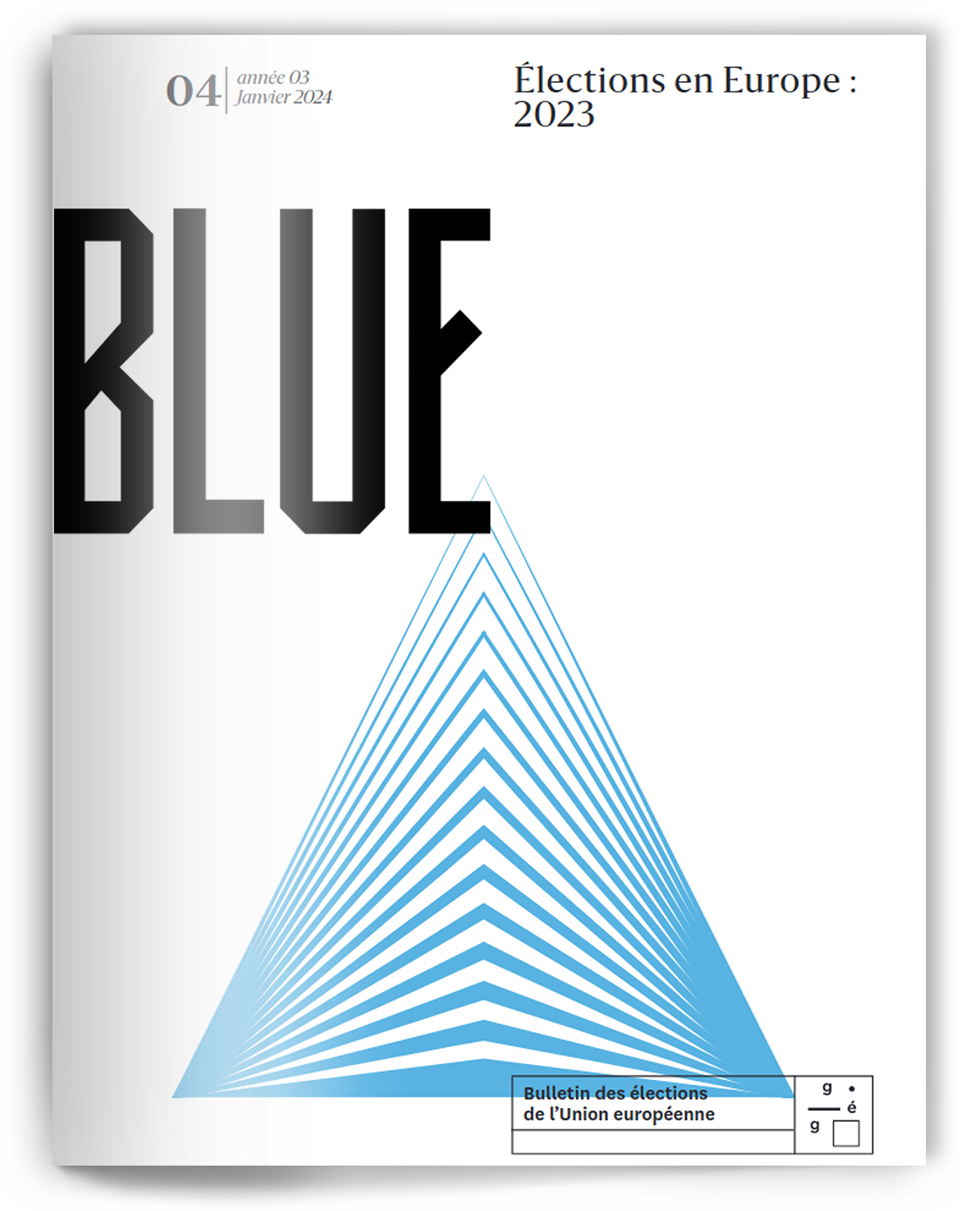
Issue 4, January 2024
Elections in Europe: 2023
Introduction
On Sunday, May 28, 2023, the citizens of Extremadura went to the polls to elect the 65 members of the regional Assembly. As every four years, the regional election was held simultaneously with the election of the representatives of the 388 municipalities of the region and with other regional elections in all other Autonomous Communities, with the exception of those communities with their own calendar: Andalusia, Catalonia, Galicia, the Basque Country and Castilla y León 1 .
The results of this election showed a trend similar to that observed in other territories. The Socialist Party (PSOE) felt the wear and tear of the national government and experienced a notable setback in a very competitive election. Despite being the most voted list, the PSOE together with its ally Unidas Podemos did not achieve the majority of seats needed to form a government. The Popular Party (PP) obtained its third best result in an Extremaduran regional election, while Vox managed to enter the regional legislature for the first time.
The PSOE’s electoral setback in multiple regional and municipal elections precipitated the calling of early elections for July 23rd. This decision had an impact on several of the pacts and negotiations for the formation of the city councils and regional governments. Thus, this process was especially uncertain and conflictive in Extremadura, due to the initial lack of understanding between the Popular Party candidate and Vox to sign a government agreement that finally materialized on June 30.
Electoral system and previous political context in Extremadura
As in the case of the legislative election, the election of the regional deputies uses the d’Hondt method with closed and blocked lists. Each of the two provinces that make up the Autonomous Community, Badajoz and Cáceres, constitutes a constituency with a minimum of 20 seats each. The remaining 25 seats are distributed proportionally to the population. In practical terms, the total population of the Community is first divided by 25 to obtain an electoral quota; then, each province is assigned a number of seats obtained by dividing the provincial population by the electoral quota; finally, the remaining deputy is assigned to the province whose quota has the highest decimal part. In these elections Badajoz elected 36 and Cáceres 29 seats. The electoral system also establishes a minimum threshold of 5% of the valid votes in order to participate in the seat apportionment process. The regulations allow a party to obtain seats if it was running in both provinces and the number of valid votes it obtained is equal or higher to 5% of the sum of the valid votes cast. Historically, few political forces other than the two traditional parties have been able to exceed this threshold (Otero Felipe 2019).
The region has been, with very few exceptions, a socialist bullwark: in ten of the eleven regional elections held to date, the PSOE has been the leading force in terms of both votes and seats, managing to govern with an absolute majority on no less than seven occasions. The PP has always been in second place, except in the 2011 election when in it managed to overtake the Socialists and obtained the presidency of the Junta, the regional government. Hence, in Extremadura, electoral concentration (the total share of votes concentrated on the first two parties) has typically been high, exceeding 80% between 1983 and 2023, while average volatility has been low, ranging from 3.4 in 2007 to 19.8 in the latest election. Until the 2015 election, only two national parties other than the PSOE and PP gained represented in the regional assembly: CDS (1987-1991) and Izquierda Unida, with the latter being the only third party to win seats in all elections except in 2007. As for the regionalist forces, only Extremadura Unida managed to enter the regional legislature between 1983 and 1987. The traditional bipolarization in Extremaduran politics was challenged in 2015 with the entry into the regional legislature of Podemos and Ciudadanos, which maintained representation in 2019.
In last May’s election, a total of twelve parties were running, a figure that exceeds those of previous elections. While the main national parties and several regionalist lists competed, only the PSOE and PP appeared able to make a claim to government leadership. The Socialist Party nominated Guillermo Fernández Vara, who was seeking reelection for his third term as president of the Junta de Extremadura, as their lead candidate. The Popular Party’s list was headed by María Guardiola, who had been serving as the party’s regional leader since 2022. Unidas por Extremadura, a coalition of Podemos, IU and the Greens, chose Irene de Miguel, until then a regional deputy, as their main candidate, while Ángel Pelayo Gordillo, a councilor in the city of Mérida, led the Vox list. Fernando Balsera was Ciudadanos’ lead candidate. The party Por un Mundo más Justo (For a Fairer World), a national minority party, participated in these elections for the second time in a row. In addition, there were six candidacies of regionalist parties that did not manage to form a common list: Una Extremadura Digna (a citizen platform formed by Actúa, the Partido Socialista Libre Federación and the Organización Defensa de lo Público), Juntos por Extremadura, the Partido Extremeñista, the provincialist parties Cáceres Viva and Somos Cáceres and, finally, the Alianza Levanta Extremadura list composed of Extremeños (previously Prex-Crex), Extremadura Unida, and the citizen platform Cacereños por Cáceres.
Pre-electoral polls predicted a PSOE victory, although far from the absolute majority obtained four years earlier. The average poll estimate predicted 41.7% of the vote for the PSOE and 35.9% for the PP. These percentages rose to 42.2% and 36.7%, respectively, in May 2023 (El Periódico Extremadura, May 9, 2023). The pre-electoral survey of the Centro de Investigaciones Sociológicas (CIS) carried out in April 2023 presented data consistent with these trends, predicting 40.6% support for the PSOE and 36.5% for the PP, despite Fernández Vara’s management being described as bad or very bad by 54% of those surveyed. In that same survey, the Extremaduran president obtained an average rating of 5.1 on a 1-10 scale, while the PP candidate was little known among the electorate. Despite Guardiola’s government experience as part of the Monago Junta from 2011 to 2015, 27% of respondents stated that they did not know her and almost 32% did not give her any rating. The combination of Guardiola’s low notoriety and Fernández Vara’s low ratings suggests that the (negative) assessment of Fernández Vara’s management played an important role in the electoral outcome.
The campaign focused on key regional issues such as post-pandemic economic recovery, employment, healthcare, education, and the territorial model. An Autonomous Community of little more than one million inhabitants distributed between two provinces, Extremadura has a Gross Domestic Product (GDP) significantly below the national average, high unemployment rates exceeding 45% among those under 25 years of age, and has not managed to curb the high rate of emigration. This, coupled with a notable lack of infrastructure and investment, means that the regions continues to face significant challenges. In fact, the CIS pre-election survey revealed that almost 55% of Extremaduran citizens considered the situation in their region as bad or very bad. Respondents had a similarly unfavorable view of the evolution of their Community’s standing: 46.5% of those surveyed stated that the situation was worse or much worse than four years earlier, while only 29.4% described it as better or much better. The parties’ electoral programs focused on the region’s endemic problems and emphasized the issue of institutional neglect.
Within the incumbent majority, various proposals were made, ranging from an economic reactivation plan to support job creation (PSOE) to a reorientation of production models towards renewable energies (Podemos-IU-AV). The PP proposed a fiscal reform aiming at attracting investments through tax cuts. Although Vox focused its campaign on national issues, promising lower taxes and advancing an anti-migration and anti-feminist agenda, it also emphasized the defense of rural areas and hunters. Finally, Ciudadanos sought to regain momentum with a liberal-centrist program.
Election results
While the PSOE remained the most voted political force, it fell below pollsters’ expectations. With 39.9% of the votes, the POSE won 28 seats (16 in Badajoz and 12 in Cáceres), five seats short of an absolute majority. The PP recovered part of the electoral potential it had lost in the previous election and tied in seats with the PSOE, obtaining 38.8%, just over one percentage point behind the Socialists. The decrease in support for the Socialist Party was significant, with more than 43,000 votes lost since the last election, a trend that was especially evident in the province of Cáceres. The PP was the leading political force in both provincial capitals and in most of the densely populated areas of the region, obtaining its second-best result in terms of seats. Vox managed to overcome the electoral threshold and obtained 8.1% of the votes and five seats, while Podemos-IU-AV, with almost 6%, defended its four seats. The election confirmed the disappearance of Ciudadanos from the regional scene: with only 0.9% of the votes, the party lost all of its seven seats. The other parties obtained a total of 4.8% of the votes and did not obtain any seats in the Assembly of Extremadura. Turnout was 67.8%, up 2.5 points from the previous election in 2019.
A challenging government formation process
Pedro Sánchez’s decision to call general elections on July 23 disrupted the phase of negotiations and agreements between the main political parties. On the one hand, the regional elections held in May had been marked by Socialist losses, including in their former stronghold of Extremadura. The significant decrease in the PSOE’s vote and seat shares gave rise to a change of cycle in the region as Fernández Vara was not able to defend the broad parliamentary majority he had achieved in the 2019 election.
On the other hand, the rule — officially supported by PP president Alberto Núñez Feijóo — according to which the most voted list should govern proved particularly complex to apply, as no party commanded the absolute majority needed to govern on its own. The PSOE and Unidas Podemos’, with 28 and 4 seats respectively, fell short of the majority in the first round (33), something that the PP (28 seats), after a pact with Vox (5 seats), could achieve.
After several government agreements between the PP and Vox were concluded in city councils and regional executives around the country, including in Valencia and the Balearic Islands, the level of uncertainty increased further. However, a few days after the election, María Guardiola ruled out a possible coalition government with Vox, criticizing the party’s programmatic positions. Guardiola’s statement raised doubts about the possibility of new elections (El País June 21). In view of this situation, Guillermo Fernández Vara, as the candidate of the most voted list, announced his intention to run for president, calling for the abstention of the other groups in order to form a regional government by simple majority. The president of the Assembly’s Bureau, Blanca Martín, set the date of election of the new executive for July 5 and 6, foreseeing that, if Fernández Vara was not elected in the first round of voting, a second round would be held on the 8th of the same month. However, these elections were never held. Following the PP and Vox national leaderships’ intervention in the negotiation process, Guardiola eventually agreed to a coalition with the radical right party, making it possible for a government agreement to be signed on June 30.
The agreement signed by the PP and Vox comprises of 60 measures divided into eight thematic blocks, similar to those that the parties had signed in other Autonomous Communities where they govern in coalition. The agreement involved the division of the Ministry of Agriculture between the two parties. Vox obtained the Department of Forestry Management and the Rural World (Gestión Forestal y Mundo Rural), which includes hunting, fishing, cattle raising, forestry, rural development and emergency management, while the PP was in charge of agriculture, livestock and CAP funds. The agreement also contemplated the transfer to Vox of one of the PP’s seats in the Senate, which Vox would have been entitled to according to its vote share. On July 14, María Guardiola was elected Regional President in the first round of voting with the support of the PP and Vox, becoming the first woman to preside over the Junta de Extremadura.
The data
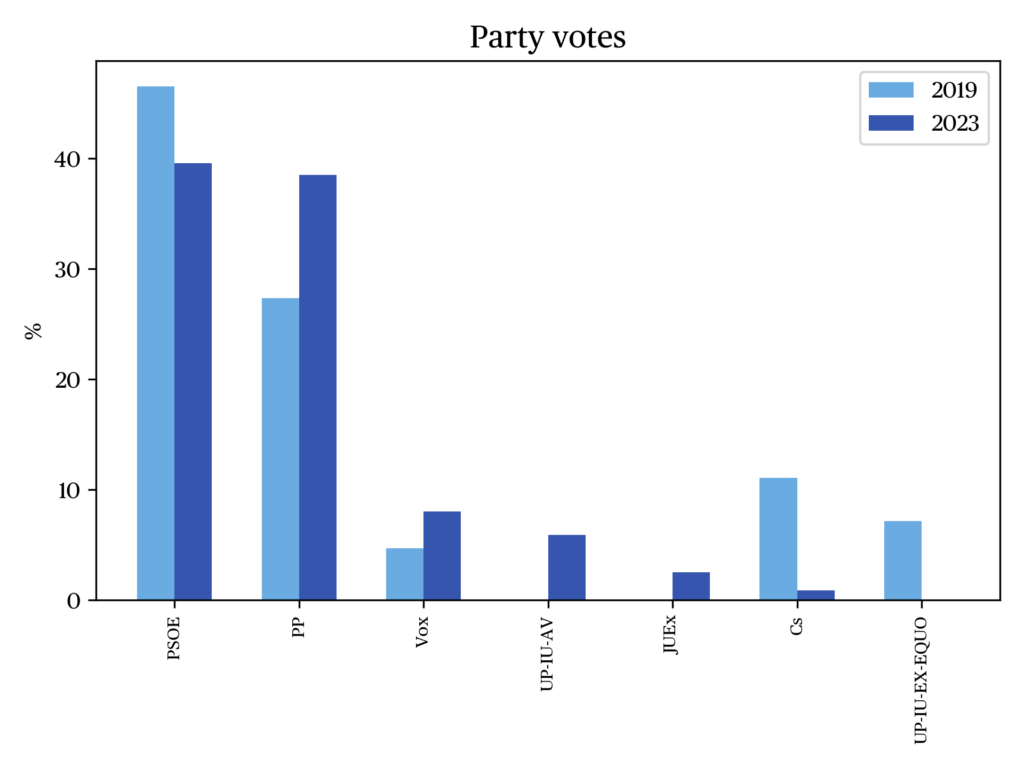
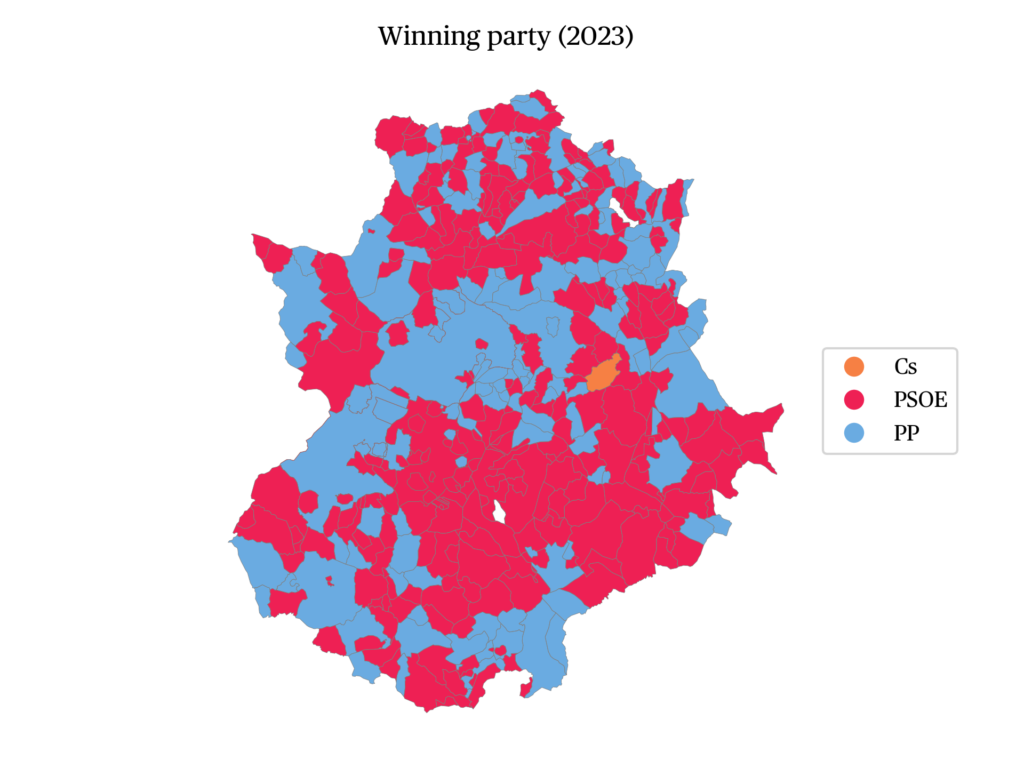
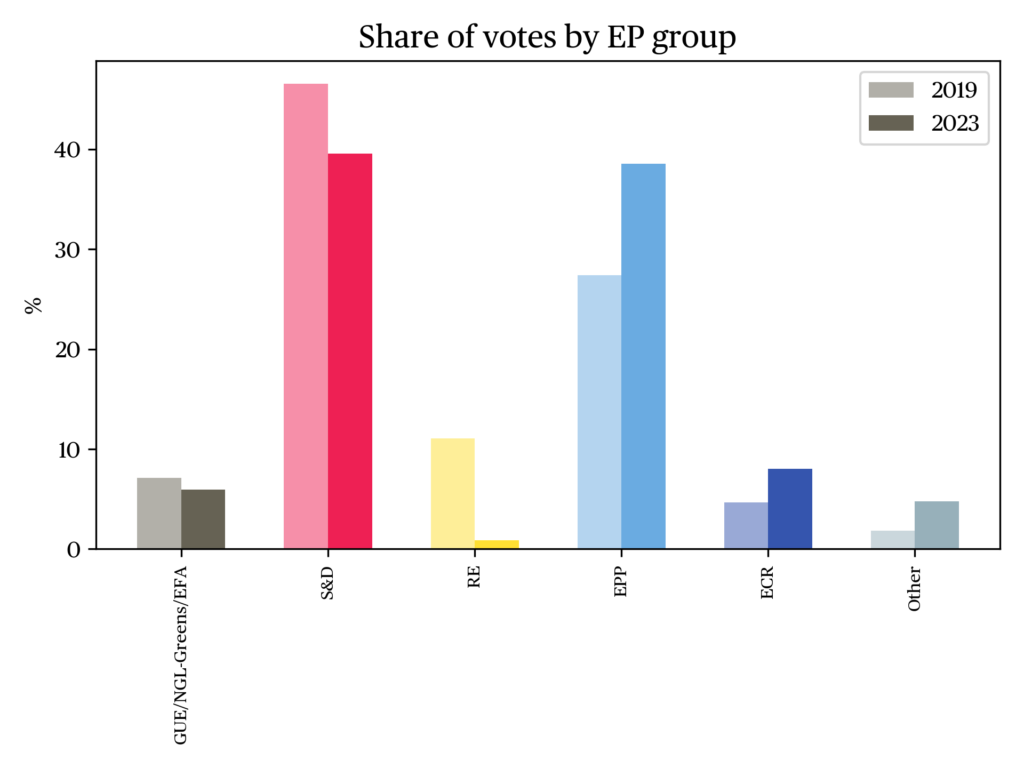
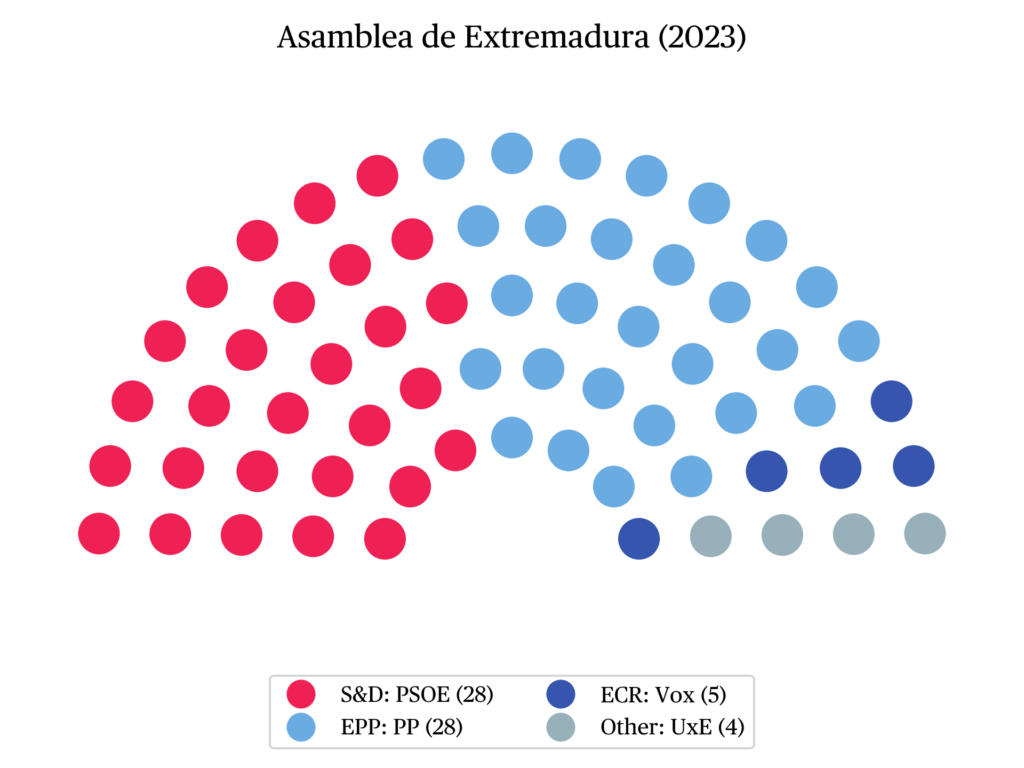
References
El Mundo (2023, June 30). PP y Vox pactan gobernar Extremadura: los de Abascal tendrán una Consejería y Guardiola dice que su palabra “no es tan importante como el futuro de los extremeños”. El Mundo.
El País (2023, June 21). Fernández Vara anuncia que se presentará a la investidura para presidir la Junta de Extremadura. El País.
El Periódico Extremadura (2023, May 9). Así están las encuestas de las elecciones en Extremadura 2023. El Periódico Extremadura.
Instituto Nacional de Estadística (INE) (2023). Population statistics.
Junta Electoral de Extremadura (2023, June 7). Acuerdo de 7 de junio de 2023, de la Junta Electoral de Extremadura, por la que se hacen públicos los resultados del escrutinio general y proclamación de diputados y diputadas electos a la Asamblea de Extremadura, efectuada por las Juntas Electorales Provinciales de Badajoz y Cáceres, resultante de las elecciones celebradas el día 28 de mayo de 2023.
Otero Felipe, P. (2019). Extremadura: estabilidad partidista en un espacio político de competición unidimensional. In Gómez Fortes, B., S. Alonso Sáenz de Oger, & L. Cabeza Pérez (eds.), En busca del poder territorial: cuatro décadas de elecciones autonómicas en España. Madrid : Centro de Investigaciones Sociológicas (CIS).
Preelectoral elecciones autonómicas (2023). Comunidad Autónoma de Extremadura. Madrid: Centro de Investigaciones Sociológicas (CIS).
Notes
citer l'article
Patricia Otero-Felipe, Juan Antonio Rodríguez-Zepeda, Regional election in Extremadura, 28 May 2023, Jun 2024,
à lire dans cette issue
voir toute la revue





